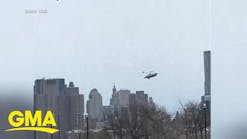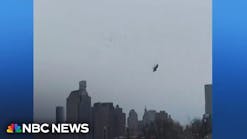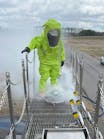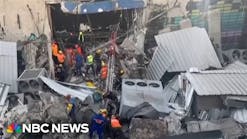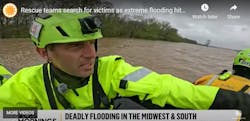Spanish officials initially blamed Basque separatists for Thursday's stunningly well-coordinated string of 10 explosions on packed commuter trains, but they also were studying a claim of responsibility by a shadowy group in the name of al-Qaida.
Prime Minister Jose Maria Aznar said no suspects have been ruled out.
``We will bring the guilty to justice,'' Aznar said at a news conference. ``No line of investigation is going to be ruled out.''
At noon, Spaniards across the nation observed several minutes of silence. Offices, shops and cafes across Spain emptied as people went to stand in the street and remember those killed.
Authorities had requested a minute's silence but many people in Madrid stood in the cool, wet weather for about 10 minutes. Afterward, many clapped - a Spanish way to show respect and say goodbye.
Underscoring jittery nerves in the capital, police hastily evacuated Atocha station, one of those bombed Thursday, because of a bomb scare that turned out to be a false alarm.
The government has called nationwide rallies for Friday evening, with European leaders, including prime ministers from France and Italy, expected to attend along with millions of Spaniards.
The death toll rose overnight from 192 to 198, deputy Justice Minister Rafael Alcala said, adding that 84 bodies remain unidentified. More than 1,400 people were wounded.
Aznar said 14 foreigners were among the dead, including three Peruvians, two Hondurans, two Poles, and a person each from France, Chile, Cuba, Ecuador, Colombia, Morocco and Guinea-Bissau.
Asian stock markets closed mostly lower and European shares were down in early trading Friday on renewed fears of terrorism following the explosions.
Three days of mourning started Friday and campaigning was called off for Spain's general election, but Foreign Minister Ana Palacio pledged that the vote would be held on Sunday as planned.
``This would be the first way to tell terrorists about our determination to go forward and that they will not succeed in their wicked cause,'' Palacio told Australia's Channel Nine television from Spain.
A major campaign issue was how to deal with ETA, the Basque militant group.
Passengers sobbed, lit candles and left flowers at Madrid's Atocha station, which was the first one hit in the attacks, and trains had to roll past wreckage left on the track.
``I saw the trains and I burst into tears. I felt so helpless, felt such anger,'' said a tearful Isabel Galan, 32.
All the television stations placed a small red-and-yellow Spanish flag with a black sash in the corner of the screen. Commuter trains also traveled with black cloth on the engine cars.
The attack occurred exactly 2 1/2 years after the Sept. 11 terrorist attacks in the United States. It also was Europe's worst since the 1988 bombing of a Pan Am jetliner over Lockerbie, Scotland, killed 270 people.
``March 11, 2004, now holds its place in the history of infamy,'' Aznar said Thursday.
U.S. Homeland Security Secretary Tom Ridge said Friday he could not confirm whether al-Qaida had a hand in the bombings.
``There is no specific information'' available pointing to the identities of the perpetrators, he told reporters during a visit to Thailand. ``There is a lot of speculation.''
The 10 backpack bombs exploded in a 15-minute span, starting about 7:39 a.m. on trains along nine miles of commuter line from Santa Eugenia to the Atocha terminal, a bustling hub for subway, commuter and long-distance trains just south of the famed Prado Museum. Police also found and detonated three other bombs.
``An act of barbaric terrorism has engulfed Spain with profound pain, repulsion and anger,'' King Juan Carlos said on national television.
Worst hit was a double-decker train at El Pozo station, where two bombs killed 70 people, fire department inspector Juan Redondo said. One corpse was blown onto the roof.
The Arabic newspaper Al-Quds al-Arabi said it had received a claim of responsibility issued in the name of al-Qaida. The e-mail claim, signed by the shadowy Brigade of Abu Hafs al-Masri, was received at the newspaper's London offices and said the brigade's ``death squad'' had penetrated ``one of the pillars of the crusade alliance, Spain.''
``This is part of settling old accounts with Spain, the crusader, and America's ally in its war against Islam,'' said the claim, which could not immediately be verified.
Spain had backed the U.S.-led war on Iraq despite domestic opposition, and many al-Qaida-linked terrorists have been captured in Spain or were believed to have operated from here.
Spain's government is studying the claim but still believes ETA is more likely responsible, a senior official in Aznar's office said.
The United States believes Al-Masri sometimes falsely claims to be acting on behalf of al-Qaida. The group took credit for blackouts in the United States and London last year.
If the attack was carried out by ETA, it could signal a radical and lethal change of strategy for the group that has largely targeted police and politicians in its decades-long fight for a separate Basque homeland.
But after police found a stolen van with seven detonators and the Arabic-language tape parked in a suburb near where the stricken trains originated, Interior Minister Angel Acebes said: ``I have just given instructions to the security forces not to rule out any line of investigation.''
A top Basque politician, Arnold Otegi, denied ETA was behind the blasts and blamed ``Arab resistance,'' noting Spain's support for the Iraq war.
The government said ETA had tried a similar attack on Christmas Eve, placing bombs on two trains bound for a Madrid station that was not hit Thursday.
The Interior Ministry said tests showed the explosives used in the attacks were a kind of dynamite normally used by ETA.
The bombers used titadine, a kind of compressed dynamite also found in a bomb-laden van intercepted last month as it headed for Madrid, a source at Aznar's office said on condition of anonymity. Officials blamed ETA then, too.
In a break with past ETA tactics, there were multiple attacks and no warning. ETA has usually gone after one target at a time and the largest casualty toll was 21 killed in 1987.
ETA has claimed responsibility for more than 800 deaths since 1968.
The United States, Britain and Russia said the attacks demonstrated the need for toughened resolve against terrorists.
President Bush called Aznar and Juan Carlos, saying he expressed ``our country's deepest sympathies toward those who lost their life.''
Aznar was a staunch supporter of U.S.-led war that ousted Saddam Hussein and Spain sent 1,300 troops to Iraq.
Aznar, who himself survived an ETA car bombing in 1995, will step down when a new government is formed after the elections.
Revulsion over the attack could benefit Aznar's ruling conservative Popular Party because of its hard-line stance against ETA.
Both the Popular Party and the opposition Socialists ruled out talks with ETA during the campaign.
The group - Euskadi ta Askatasuna, or Basque Homeland and Freedom - is believed by police to number perhaps only several dozen hard-core militants supported by a wider group of Basque nationalists.
The government recently expressed cautious optimism that ETA was near defeat after mass arrests, seizures of weapons and explosives, increased cooperation from France and the banning of ETA's purported political front. The number of people killed in ETA attacks dropped to three last year.
Related:
